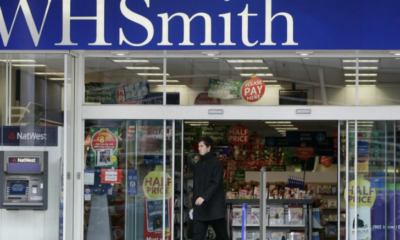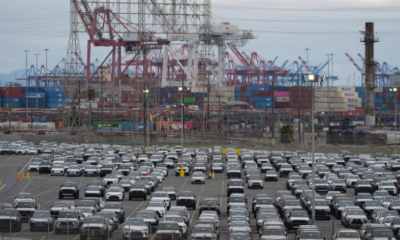Business
Ryanair Reports 18% Decline in Profits Amid Lower Airfares and Boeing Delays
Ryanair Holdings plc has announced an 18% drop in after-tax profit for the first half of its financial year, reporting earnings of €1.79 billion for the period ending September 30. Despite a 9% increase in passenger traffic, reaching 115 million customers, the low-cost airline attributed its profit decline primarily to reduced airfares, which fell by an average of 10% over the six months.
The growth in passenger numbers underscores the airline’s resilience despite significant operational challenges. Ryanair cited “repeated Boeing delays” as a factor that is likely to impact future traffic targets, leading to a revised passenger forecast for the upcoming financial year, which begins on April 1, 2025. In a statement, Ryanair Group CEO Michael O’Leary explained that the company expects a reduction in next year’s traffic growth target from 215 million to 210 million passengers due to delays in aircraft deliveries. “While we continue to work with Boeing leadership to accelerate aircraft deliveries ahead of peak spring 2025, the risk of further delivery delays remains high,” O’Leary stated. He emphasized that the adjustment would prevent the airline from being “over-scheduled, over-crewed, and over-costed” as it was in spring 2024.
Financially, Ryanair has been active in shareholder returns. The airline restarted its share buyback program in May, completing €700 million by August. An additional €800 million in buybacks is anticipated by mid-2025, which would bring the total shareholder return since 2008 to nearly €9 billion, including dividends. The company also announced a dividend increase, with a final dividend of €0.178 per share paid in September, and an interim dividend of €0.223 per share scheduled for February 2025.
Looking ahead, Ryanair is cautiously optimistic about stabilizing airfares over the next six months. The airline aims to meet its passenger targets of between 198 million and 200 million by March 31, 2025, representing an 8% year-on-year increase, provided Boeing’s delivery issues do not further disrupt operations. O’Leary expressed confidence in moderating the pricing decline, which has impacted profits this year, although he warned that further delays from Boeing could affect passenger forecasts.
Ryanair’s results reflect the balancing act between managing fleet expansions and navigating unpredictable supplier delays, with the company strategically scaling back projections to mitigate potential disruptions. The financial adjustments, including the share buyback and dividend increase, signal a commitment to shareholder returns, while the focus on conservative growth reflects a pragmatic approach to the ongoing supply chain uncertainties affecting the airline industry.
Ryanair’s continued push for operational growth despite external constraints, alongside its active financial management, will be closely watched by stakeholders as it approaches the next phase of its fiscal year and Boeing’s delivery timeline remains uncertain.
Business
Economic Uncertainty Over US Tariffs Threatens Eurozone and UK Growth
Uncertainty surrounding US trade tariffs is set to cost the eurozone and UK economies billions over the next two years, according to a recent report by S&P Global. The potential economic fallout cannot be fully offset by increased defence spending, despite upcoming fiscal stimulus measures in Europe.
Eurozone Growth Downgraded Amid Trade Concerns
S&P Global’s latest economic forecast projects that the eurozone economy, valued at €14.6 trillion, will contract by 0.4% of GDP cumulatively in 2025 and 2026 due to trade-related uncertainty. Prior to the recent announcement of 25% tariffs on US car imports, the organization had already downgraded its eurozone growth expectations for 2025 from 1.2% to 0.9%.
Sylvain Broyer, Chief Economist for Europe, the Middle East, and Africa (EMEA) at S&P Global, emphasized that “uncertainty itself is likely to pose a greater risk to the European economy than the tariffs alone.”
While US tariffs could weaken economic recovery, there are some positive indicators. Fiscal stimulus measures in Germany and the broader EU could help drive eurozone GDP growth to 1.4% in 2026. Additionally, confidence in the region is improving due to falling inflation and interest rates, which are strengthening the labour market.
Potential Economic Impact of Tariffs
S&P Global considered multiple scenarios regarding the impact of US tariffs on the eurozone economy. In the worst-case scenario, where all EU exports to the US face a 25% tariff, eurozone GDP growth could be limited to 0.5% in 2025 and 1.2% in 2026.
Germany, heavily reliant on US car exports, would be particularly affected. Broyer noted that Germany’s exposure to US car markets is 1.5 times the European average, and tariffs could lower its economic output by 0.1% in 2025.
Despite these challenges, EU defence spending could provide some economic support. European governments are expected to increase defence budgets by 1% of GDP from 2026 onward, potentially boosting eurozone GDP by 0.1% in 2026, 0.2% in 2027, and 0.3% in 2028.
European Central Bank’s Expected Response
S&P Global anticipates that the European Central Bank (ECB) will cut interest rates once more in 2025, reducing the rate to 2.25% by mid-year. However, it expects the ECB to start raising rates again in the second half of 2026, with two hikes bringing the deposit facility rate to 2.75% by year-end.
Broyer warned that additional risks to the forecast include continued trade uncertainty, potential failures in executing fiscal plans, and economic slowdowns in the US due to rising import costs. However, stronger-than-expected fiscal stimulus could improve confidence and support growth.
UK Growth Forecast Cut Nearly in Half
The UK is also facing economic headwinds. Before the car tariff announcement, S&P Global had already lowered its UK growth forecast for 2025 from 1.5% to 0.8%, citing persistent inflation, weak export volumes, and restrictive monetary policy.
Marion Amiot, Chief UK Economist at S&P Global Ratings, highlighted that if the UK cannot avoid the newly imposed 25% tariffs on car exports to the US, it could face an additional 0.2% hit to GDP. “Car exports to the US are the largest source of bilateral goods trade surplus for the UK,” Amiot noted.
The UK’s export sector is struggling due to weak demand in Europe and China, as well as the strong value of the British pound. High energy and labour costs are also limiting competitiveness. “Energy prices are still twice as high today as they were before the energy crisis, so businesses have a lot to absorb,” Amiot explained.
The Bank of England’s Dilemma
The Bank of England (BoE) faces a challenging economic landscape. While businesses and investors are eager for interest rate cuts, inflation remains a key concern. In its latest meeting, the BoE kept its benchmark interest rate at 4.5%, despite inflation dropping to 2.8% in February.
S&P Global predicts that the BoE will lower rates to 4% by the third quarter of 2025, although it now expects one fewer rate cut than previously forecast. Inflationary pressures are likely to remain a constraint on monetary policy decisions.
Looking ahead, UK economic growth is expected to accelerate in 2026, with S&P Global projecting a 1.6% GDP increase. “Things are looking up for 2026, with regional growth picking up, interest rates cut by another 50 basis points, and inflation edging back to 2.5%,” the report concluded.
As trade tensions and policy uncertainty continue to shape economic conditions, both the eurozone and the UK must navigate a complex environment, balancing fiscal stimulus with monetary policy adjustments to maintain stability and growth.
Business
WH Smith to Exit UK High Streets in £76M Deal, Marking Another Blow to Retail Sector
British books and stationery retailer WH Smith is set to disappear from UK high streets following a £76 million (€91.2 million) deal to sell its 480 retail outlets to private equity firm Modella Capital, the owner of Hobbycraft.
The move is the latest in a series of high-profile closures affecting the UK retail landscape, which has struggled to recover from the pandemic. WH Smith, a brand with over two centuries of history, will continue to operate under its name in airports, railway stations, and hospitals, but its high street stores will be rebranded as TGJones.
Retail Shake-Up as Modella Capital Expands Portfolio
Modella Capital, which has previously acquired The Original Factory Shop and Hobbycraft, will take control of WH Smith’s high street operations, including several stores in shopping centres and retail parks. However, the exact timeline for the transition remains undisclosed.
WH Smith’s Post Office counters will continue running as usual, and the company has reassured customers that business operations will remain normal during the transition. The retailer, which employs around 5,000 people across more than 1,100 stores in the UK, has also hinted at exploring further strategic changes, including the potential sale of its digital greetings card brand, Funky Pigeon.
Despite the deal, concerns remain over potential job losses, though Modella has not confirmed whether redundancies will follow. The firm has stated that new product ranges will be introduced, but further operational details have not yet been revealed.
WH Smith Shifts Focus to Travel Business
The decision to exit high streets comes as WH Smith pivots towards its more profitable travel division. Group CEO Carl Cowling highlighted that the high street business, while still profitable, had become a smaller part of WH Smith’s overall operations amid the company’s international expansion.
“Our UK High Street business has been a good, cash-generating operation, but with our rapid international growth, now is the right time for a new owner to take it forward,” Cowling said. “This will allow WH Smith’s leadership team to focus exclusively on our travel business, which has stronger growth prospects.”
Russ Mould, investment director at AJ Bell, noted that the deal enables WH Smith to concentrate on expanding its travel retail footprint. However, he cautioned that losing the WH Smith name from high streets could negatively impact footfall.
“The WH Smith brand was a key reason why its stores survived in an increasingly challenging retail environment,” Mould said. “Shoppers relied on the retailer for specific items, and removing the brand could see customer traffic decline under the new TGJones name.”
High Streets Continue to Struggle
The departure of WH Smith from UK high streets is expected to further weaken an already struggling retail sector. The pandemic and changing consumer habits have led to a wave of closures, including Debenhams, Daniel of Ealing, and Cool Britannia. Retailers like New Look, Quiz Clothing, and Select Fashion have also been forced to shut multiple locations.
High street banks have followed a similar trend, with major lenders like Halifax, Lloyds, Bank of Scotland, and Barclays closing branches in response to shifting consumer behaviour.
Despite these challenges, the retail sector showed resilience in February, with the Office for National Statistics (ONS) reporting a 1% monthly increase in sales volumes. This exceeded market expectations of a 0.3% decline and followed a 1.4% rise in January.
Household goods led the growth, experiencing their strongest monthly performance since April 2021, while clothing and footwear sales also contributed positively. However, food store sales saw a decline.
On an annual basis, retail sales in February rose 2.2%, surpassing analyst projections of a 0.5% gain.
Consumer Spending Outlook Remains Mixed
Looking ahead, consumer spending trends appear uncertain. A McKinsey & Company report found that while 22% of shoppers plan to increase spending on garden furniture and 17% on hotels, many are cutting back in other areas.
“Nearly 40% of consumers plan to reduce clothing purchases, and almost half (49%) intend to spend less on jewellery,” said Sagar Shah, associate partner at McKinsey & Company.
He also noted that while inflation is easing, it has yet to drive stronger sales volume growth. Rising wages are putting pressure on retailers’ margins, forcing them to adjust pricing strategies and promotional tactics to maintain profitability.
As WH Smith transitions out of the high street retail landscape, the sector faces ongoing uncertainties, with businesses having to adapt to changing consumer preferences and economic conditions.
Business
British Steel Faces Closure of Blast Furnaces, Putting 2,000 Jobs at Risk
More than 2,000 jobs are at risk as British Steel, the UK’s second-largest steelmaker, announced plans to shut down its blast furnaces and steelmaking operations in Scunthorpe. The decision follows failed negotiations between the company’s Chinese owner, Jingye, and the UK government over a financial support package.
Unions Call for Government Intervention
Unions have urged the government to step in and secure the future of British Steel, which has been incurring daily losses of around £700,000 (€840,000). Since acquiring the company in 2020, Jingye has invested over £1.2 billion to sustain operations but cited “highly challenging market conditions, tariffs, and rising environmental costs” as key reasons for the decision to shut down primary steel production.
British Steel is currently consulting with unions on the closures and potential reductions in rolling mill capacity, which could take effect as early as June. Between 2,000 and 2,700 jobs are at stake.
Failed Rescue Talks and Calls for a Green Transition
The company had sought government support for a significant investment in two new electric arc furnaces, which would reduce carbon emissions compared to traditional blast furnaces. However, after months of negotiations, no agreement was reached.
Unions had proposed a transition plan to decarbonize steelmaking, advocating for continued operation of the existing blast furnaces while the new electric furnaces were being built. This strategy would require an additional £200 million in government support to offset carbon costs during the transition period.
“This is a dark day for our steel industry and our country,” said Roy Rickhuss, General Secretary of the Community union. “The closures at Scunthorpe would be a hammer blow to communities built on steel, where thousands of jobs—both directly and in the supply chain—depend on this industry.”
Rickhuss urged both the government and Jingye to resume negotiations, emphasizing that the company has not ruled out keeping the blast furnaces operational during a transition if government support is secured.
Government Response
Business and Trade Secretary Jonathan Reynolds stated that the government remains committed to finding a solution. “We’ve been clear there’s a bright future for steelmaking in the UK, and we will continue working tirelessly to reach an agreement,” he said.
Decline of the UK Steel Industry
Once a global leader, British steel production employed over 300,000 people in the postwar era. However, competition from cheaper steel imports, particularly from China, has significantly reduced its footprint. Today, the industry employs around 40,000 people, contributing just 0.1% to the UK economy.
With uncertainty looming over the future of British Steel, industry leaders and unions continue to push for a government-backed strategy to secure jobs and ensure the long-term sustainability of steel production in the UK.
-

 Business10 months ago
Business10 months agoSaudi Arabia’s Model for Sustainable Aviation Practices
-

 Business10 months ago
Business10 months agoRecent Developments in Small Business Taxes
-

 Politics10 months ago
Politics10 months agoWho was Ebrahim Raisi and his status in Iranian Politics?
-

 Business9 months ago
Business9 months agoCarrectly: Revolutionizing Car Care in Chicago
-

 Business9 months ago
Business9 months agoSaudi Arabia: Foreign Direct Investment Rises by 5.6% in Q1
-

 Technology10 months ago
Technology10 months agoComparing Apple Vision Pro and Meta Quest 3
-

 Politics10 months ago
Politics10 months agoIndonesia and Malaysia Call for Israel’s Compliance with ICJ Ruling on Gaza Offensive
-

 Technology10 months ago
Technology10 months agoRecent Developments in AI Ethics in America



























